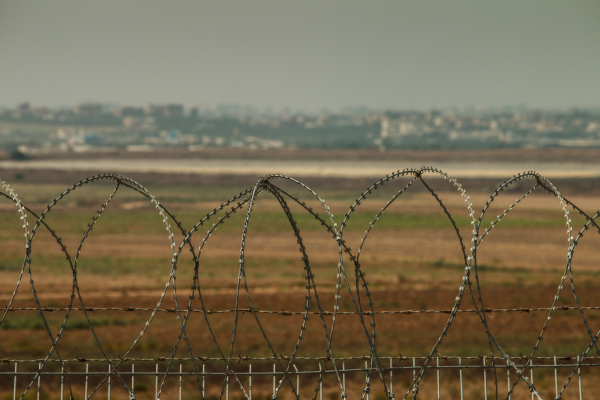Proposal title: Responding to the crisis in Palestine and Israel
Originating Body: Members of the order of ministry from Saskatoon. (Scroll to the end).
Results: Passed by the meeting of Living Skies Regional Council, 14 June 2024.
A new group has formed to help implement the decision, currently mostly made up of the Proposal originators, with some new additional members. They will relate to the Justice Team for reporting and engagement. New members to the group are welcome and do not need to be part of the Nominations process, as this is an informal group. Please contact staff support Julie Graham to get in touch with the group, so that we can protect personal email privacy: jgraham@united-church.ca
What is the issue? And what is happening now?
A genocide is happening in Gaza, and we don’t know how to stop it or even how to speak about it. Fear of being labeled “antisemitic” can inhibit criticism of the actions of the Israeli government. Canadians tend to know more about the suffering of the Jewish people historically than about Palestinians’ experience under Israeli occupation. This is not just a terrible event happening somewhere far away. It also impacts us closer to home. Palestinians are our neighbours in Saskatchewan, and they fear for the safety of their loved ones in Gaza, the West Bank, and East Jerusalem. United Church members have, with other observers, witnessed the violent treatment of peaceful protesters on the campus of the University of Calgary.
Yet, Jesus calls us to cry out for justice, to protest such violence and destruction. The United Church of Canada calls us to “deep spirituality, bold discipleship, and daring justice.” Throughout scripture, God requires the faithful to act for just peace. It took a global movement, including churches around the world, to end apartheid and settler colonialism in South Africa. It will take the same to end apartheid, occupation, and settler colonialism, and to establish a just peace in Israel- Palestine. The United Church has encouraged its members to respond in various ways (see Background Information, below). We propose that as the LSRC we educate and equip ourselves to speak responsibly, to pray, and to act.
How might the Regional Council or General Council respond to the issue?
1. Develop Resources for Education and Discussion
Assist Regional Council staff, members, and communities of faith in convening safe spaces for brave conversations and dialogue, by making available educational resources compiled by the newly formed “Just Peace Palestine/Israel Cluster” of the Living Skies Justice Team. Resources, from the United Church and other churches and organizations, might include study guides, speakers, webinars, and/or films on the following topics:
- Explaining the context of Israel’s current war on Gaza and the role of Hamas; and the history of Zionism, the Nakba, and the settler occupation of Palestine.
- Clarifying terms, g., anti-Judaism, anti-Zionism, anti-Semitism, anti-Palestinian racism, and Islamophobia, in order to help members constructively criticize the policy and actions of the government and state of Israel and of Palestinian governing bodies.
- Providing links to other cultural, religious, or activist organizations working in this area, g., Canadians for Justice and Peace in the Middle East (CJPME); Free Palestine; Independent Jewish Voices (IJV).
2. Adopt Clear Policies within the Regional Council to:
- Grant high priority to providing the educational resources named above, as part of the Church’s overall anti-racism initiatives and de-colonializing imperatives;
- Provide regular and frequent updates to local communities of faith via the LSRC Rambler, the LSRC Facebook page, and other means of communication about the unfolding situation and any actions taken by the United Church of Canada;
- Encourage members to participate in groups and actions (including cultural events, letter writing and petition campaigns) that work for an end to the genocidal violence and seek just solutions that will lead to lasting peace in Palestine/Israel.
- Affirm, in its communications with the GCE and within the LSRC, including the Regional Rambler newsletter, support for the United Church’s calls to the Government of Canada for a permanent ceasefire, a two-way arms embargo, humanitarian aid, and a just and lasting peace in Palestine/Israel.
3. Call upon the Government of Saskatchewan to:
- Call for an immediate and permanent ceasefire in Gaza and a negotiated settlement that recognizes the equality of all people living in Israel and Palestine and their right to live in peace and security, with full human rights under international law.
- Apologize to the protestors who peacefully attended the legislature on November 20, 2023, for the Saskatchewan Party’s false accusations and mischaracterization of their actions as “rioting.”
4. Background information
The United Church of Canada currently states the following on its website as its positions (as of May 17, 2024):
People in Gaza are experiencing utter destruction, loss of lives, and inhumane conditions without access to basic necessities for life. Famine is imminent. Children are particularly impacted. Our faith and our humanity call us to act now to ensure an end to the conflict. It will take all of our efforts to get the Government of Canada to do everything in its power to help bring an end to the conflict and to not be complicit in genocide and famine.
Please join us in action: advocate, join a pilgrimage, pray, and donate.
The United Church of Canada’s Mission and Service partners are responding to those impacted by the conflict in the West Bank and East Jerusalem. They will rapidly expand their activity into Gaza and provide aid when a safe humanitarian corridor opens.
The United Church is working with Mission and Service partners ACT Alliance and Department of Service to Palestinian Refugees (opens in a new tab) (DSPR). As a member of the Canadian Foodgrains Bank, we are also working with Foodgrains Bank partners on the ground to offer lifesaving support to Palestinians in the West Bank and East Jerusalem, and Gaza.
Pray for peace with justice for the people of Palestine and Israel. As people of faith, we bring the grief, compassion, and concerns of a hurting world to God.
The United Church of Canada urges the Government of Canada to do everything in its power to bring an end to the conflict and to not be complicit in genocide and famine. We need Canada to act on three fronts:
- First, a permanent ceasefire is essential to allow for safe delivery of critical humanitarian relief into Gaza—food, medicine, potable water—and also to create conditions for a just and lasting peace and basic human dignity in the region. So, we call on Canada to use all diplomatic channels and leverage points to secure an immediate and permanent ceasefire, and for Canada to implement a comprehensive and binding arms embargo.
- Second, humanitarian aid—including from The United Church of Canada Mission and Service partners—needs to reach those in need, urgently and abundantly. So, we call on Canada to use all diplomatic, political, and economic channels and leverage points to urge Israel to ensure safe passage of humanitarian aid to Gaza. Canada should also increase its aid envelope and help support refugees.
- Third, we must support building the conditions for a just and lasting peace—where safety, respect for rights, justice, and human dignity is safeguarded for all.
- So, we call on Canada to support international efforts to hold all parties accountable for violations of international law to make sure this situation never repeats itself, and to commit to long-term engagement in the region.
Canada has a legal and moral duty to do everything in its power to prevent acts of genocide and avoid complicity in any such acts, because it is a signatory to the Convention on the Prevention and Punishment of the Crime of Genocide and the Convention on the Rights of the Child.
How does this proposal help us to live into our church’s commitments on equity?
This proposal responds to the Strategic Plan of the United Church of Canada, which calls its members to “witness in love and justice to the liberating healing Christ risen in this place and time;” “to be a bold, connected, evolving church of diverse, courageous, hope-filled communities united in deep spirituality, inspiring worship and daring justice;” “to have a common orientation towards work that is deep, bold, and daring;” and “to embolden justice: collaborating to mend church and world.”
Further, it enacts the seven principles developed to guide the Church’s justice work: anti- oppression, truth-telling, holistic scope, respect for human dignity, full participation and decolonization, equity mutuality and reparations, and costly and prophetic solidarity. The educational resources we propose will advance the church’s Anti-Racism initiatives and de- colonializing imperatives as they help us to navigate the narratives of this devastating situation.
Respectfully submitted by:
Sandra Beardsall, VAM, Grace-Westminster United Church Brenda Curtis, Minister, Grace-Westminster United Church Vicki Obedkoff, VAM, Grosvenor Park United Church Ursula Wiig, VAM, Grosvenor Park United Church




